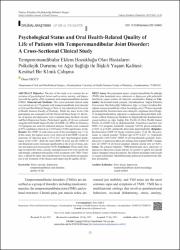Psychological Status and Oral Health-Related Quality of Life of Patients with Temporomandibular Joint Disorder: A Cross-Sectional Clinical Study
Citation
Ekici, Ö. (2022). Psychological Status and Oral Health-Related Quality of Life of Patients with Temporomandibular Joint Disorder: A Cross-Sectional Clinical Study. Turkiye Klinikleri Journal of Dental Sciences, 28(1).Abstract
Objective: The aim of this study is to examine the association of psychological factors such as stress, anxiety, and depression with the quality of life in patients with temporomandibular disorder (TMD). Material and Methods: This cross-sectional clinical study was carried out on 375 patients with temporomandibular joint disorder in Oral and Maxillofacial Surgery Clinic of Afyonkarahisar University of Health Sciences Faculty of Dentistry. While the stress level of the participants was evaluated with the Perceived Stress Scale-14, the levels of anxiety and depression were evaluated using the Beck Anxiety and Beck Depression Scales. Participants' quality of life was evaluated using the Oral Health Impact Profile-14 (OHIP-14). SPSS for Windows 21.0 program was used for statistical analyses. Results were evaluated in 95% confidence interval, at p<0.05 and p<0.001 significance levels. Results: The OHIP-14 scale mean score of the participants was 17.42. In this study, the highest scores were observed in the OHIP-14 sub-dimensions of 'physical pain (3.97±2.22)' and 'psychological disturbance (3.02±2.09)'. Both the total OHIP-14 score and the OHIP-14 sub-dimension scores increased significantly as the levels of stress, anxiety and depression increased (p<0.05). Conclusion: These study findings revealed that stress, anxiety, and depression level were positively and strongly correlated with quality of life in patients with TMD. Therefore, it should be taken into consideration in the psychosocial parameters in the treatment of the disease and improving the quality of life. Amaç: Bu çalışmanın amacı, temporomandibular bozukluğu (TMB) olan hastalarda stres, anksiyete ve depresyon gibi psikolojik faktörlerin yaşam kalitesi ile ilişkisini incelemektir. Gereç ve Yöntemler: Bu kesitsel klinik çalışma, Afyonkarahisar Sağlık Bilimleri Üniversitesi Diş Hekimliği Fakltesinin Ağız ve Çene Cerrahisi Kliniğinde temporomandibular eklem bozukluğu olan 375 hasta üzerinde gerçekleştirildi. Katılımcıların stres düzeyleri Algılanan Stres Ölçeği- 14 ile değerlendirilirken, anksiyete ve depresyon düzeyleri Beck Anksiyete ve Beck Depresyon Ölçekleri ile değerlendirildi. Katılımcıların yaşam kalitesi ise Ağız Sağlığı Etki Profili-14 [Oral Health Impact Profile-14 (OHIP-14)] ile değerlendirildi. İstatistiksel analizler için SPSS 21.0 programı kullanıldı. Sonuçlar %95'lik güven aralığında, p<0,05 ve p<0,001 anlamlılık düzeyinde değerlendirildi. Bulgular: Katılımcıların OHIP-14 ölçeği ortalama puanı 17,42 idi. Bu çalışmada, en yüksek puanlar 'fiziksel ağrı (3,97±2,22)' ve 'psikolojik rahatsızlık (3,02±2,09)' OHIP-14 alt boyutlarında gözlendi. Stres, anksiyete ve depresyon düzeyleri arttıkça hem toplam OHIP-14 puanı hem de OHIP-14 alt boyut puanları anlamlı olarak arttı (p<0,05). Sonuç: Bu çalışma bulguları, TMB hastalarında stres, anksiyete ve depresyon düzeyinin yaşam kalitesi ile pozitif ve güçlü bir şekilde ilişkili olduğunu ortaya koymuştur. Bu nedenle hastalığın tedavisinde ve yaşam kalitesinin yükseltilmesinde psikososyal parametreler dikkate alınmalıdır.
















